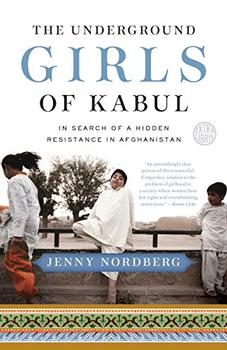Summary | Excerpt | Reading Guide | Discuss | Reviews | Beyond the Book | Readalikes | Genres & Themes | Author Bio

In Search of a Hidden Resistance in Afghanistan
by Jenny NordbergCHAPTER ONE
THE REBEL MOTHER
Azita, a few years earlier
Our brother is really a girl."
One of the eager-looking twins nods to reaffirm her words. Then she turns to her sister. She agrees. Yes, it is true. She can confirm it.
They are two ten-year-old identical girls, each with black hair, squirrel eyes, and a few small freckles. Moments ago, we danced to my iPod set to shuffle as we waited for their mother to finish a phone conversation in the other room. We passed the headphones between us, showing off our best moves. Though I failed to match their elaborate hip rolls, some of my most inspired sing-along was met with approval. It actually sounded pretty good bouncing off the ice-cold cement walls of the apartment in the Soviet-built maze that is home to a chunk of Kabul's small middle class.
Now we sit on the gold-embroidered sofa, where the twins have set up a tea service consisting of glass mugs and a pump thermos on a silver-plated tray. The mehman khana is the most opulent room in an Afghan home, meant to show off the wealth and good moral character of its owners. Cassette tapes with Koran verses and peach-colored fabric flowers sit on a corner table where a crack has been soldered with Scotch tape. The twin sisters, their legs neatly folded underneath them on the sofa, are a little offended by my lack of reaction to their big reveal. Twin number two leans forward: "It's true. He is our little sister."
I smile at them, and nod again. "Yes." Sure.
A framed picture on a side table shows their brother posing in a V-neck sweater and tie, with his grinning, mustached father. It is the only photo on display in the living room. His oldest daughters speak a shaky but enthusiastic English, picked up from textbooks and satellite television from a dish on the balcony. We just have a language barrier here, perhaps.
"Okay," I say, wanting to be friendly. "I understand. Your sister. Now, what is your favorite color, Benafsha?"
She goes back and forth between red and purple before passing the question to her sister, where it gets equally serious consideration. The twins, both dressed in orange cardigans and green pants, seem to do most things in perfect girly synchronicity. Their bobbing heads are topped with glittery hair scrunchies, and only when one speaks will the other's scrunchie be still for a few seconds. Those moments are a beginner's chance to tell them apart: A small birthmark on Beheshta's cheek is the key. Benafsha means "flower"; Beheshta, "paradise."
"I want to be a teacher when I grow up," Beheshta volunteers for our next topic.
When it becomes each of the twins' turns to ask a question, they both want to know the same thing: Am I married?
My response mystifies them, since—as they point out—I am very old. I am even a few years older than their mother, who at thirty-three is a married mother of four. The twins have another sister, too, in addition to their little brother. Their mother is also in the national parliament, I say to the twins. So there are many things I am not, compared to her. They seem to appreciate that framing.
Their brother suddenly appears in the doorway.
Mehran, age six, has a tanned, round face, deep dimples, eyebrows that go up and down as he grimaces, and a wide gap between his front teeth. His hair is as black as that of his sisters, but short and spiky. In a tight red denim shirt and blue pants, chin forward, hands on hips, he swaggers confidently into the room, looking directly at me and pointing a toy gun in my face. Then he pulls the trigger and exclaims his greeting: phow. When I fail to die or shoot back, he takes out a plastic superhero from his back pocket. The wingman has blond hair, shiny white teeth, two gun belts slung across his bulging chest, and is armed with a machine gun. Mehran says something in Dari to the figurine and then listens intently to him. They seem to agree: The assault has been a success.
Excerpted from The Underground Girls of Kabul by Jenny Nordberg. Copyright © 2014 by Jenny Nordberg. Excerpted by permission of Crown. All rights reserved. No part of this excerpt may be reproduced or reprinted without permission in writing from the publisher.
Your guide toexceptional books
BookBrowse seeks out and recommends the best in contemporary fiction and nonfiction—books that not only engage and entertain but also deepen our understanding of ourselves and the world around us.